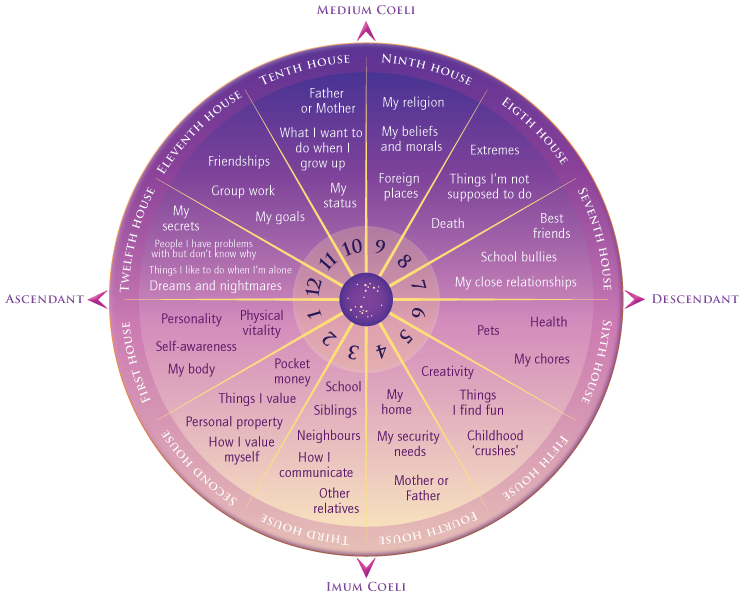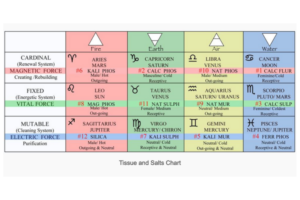Intro to the 12 Houses
Astrology has long been a tool for understanding the complexities of human life, including our health. Each of the 12 houses in an astrological chart represents different aspects of our existence, and this includes various facets of health and well-being. By examining these houses, we can gain insights into how the celestial influences might impact our physical and mental health. Here’s a guide to understanding the 12 houses of health using traditional astrology principles.
The Distinction Between Houses and Signs
It’s important to note that the houses and the zodiac signs, while interconnected, are distinct concepts in astrology. The signs describe personality traits and behavioral tendencies, whereas the houses indicate the areas of life where these traits manifest.
For instance, while Aries is about initiative and action, the house where Aries is placed in your chart will show where you channel this energy—be it in career, relationships, or personal growth. In Traditional Astrology, the meanings of the signs do not directly associate with the houses, although there is some overlap, as they do in modern.

The First House: The Self and Physical Appearance
The first house, also known as the Ascendant or Rising sign, is the house of self. It represents your physical appearance, overall health, and the way you present yourself to the world. This house sets the tone for your entire natal chart, influencing your basic personality and approach to life.
The Second House: Personal Resources and Material Well-being
The second house is associated with personal finances, possessions, and values. It reflects how you earn and spend money, as well as what you value most in life. This house also gives insight into your self-worth and how you find security.
The Third House: Communication and Siblings
The third house governs communication, intellect, and immediate environment. It’s linked to early education, local travel, and relationships with siblings and neighbors. This house reveals how you process information and interact with your immediate surroundings.
The Fourth House: Home, Family, and Emotional Foundations
The fourth house is the foundation of the chart, associated with home, family, and ancestry. It represents your roots, domestic life, and emotional security. This house sheds light on your upbringing and how it shapes your sense of stability and belonging.
The Fifth House: Creativity, Pleasure, and Children
The fifth house is the domain of creativity, pleasure, and self-expression. It’s linked to activities that bring joy, such as hobbies, romance, and entertainment. This house also governs children and your approach to parenting and nurturing creativity.
The Sixth House: Health, Habits, and Daily Routines
The sixth house relates to health, daily routines, and service. It emphasizes the importance of work habits, discipline, and self-care. This house also covers relationships with colleagues and the overall structure of your daily life.
The Seventh House: Partnerships and Marriage
The seventh house is traditionally associated with partnerships, including marriage and business relationships. It reflects how you relate to others on a one-to-one basis and what you seek in significant relationships. This house also shows potential conflicts and how you navigate them.
The Eighth House: Transformation, Shared Resources, and Sexuality
The eighth house deals with transformation, shared resources, and sexuality. It’s connected to matters of birth, death, and rebirth, as well as inheritance and joint finances. This house delves into deep psychological issues and the processes of profound change.
The Ninth House: Higher Learning, Travel, and Philosophy
The ninth house is associated with higher learning, long-distance travel, and philosophical pursuits. It represents your quest for knowledge, spiritual growth, and exploration of different cultures and belief systems. This house encourages expanding your horizons and seeking wisdom.
The Tenth House: Career, Public Life, and Reputation
The tenth house governs career, public life, and reputation. It’s linked to your ambitions, achievements, and status in society. This house shows your professional path and the legacy you aim to leave behind. It’s often associated with the parent who influences your public persona.
The Eleventh House: Friendships, Aspirations, and Social Networks
The eleventh house is the realm of friendships, social networks, and aspirations. It reflects your involvement in groups, community, and your broader goals for the future. This house shows how you connect with others to achieve common objectives and support each other’s growth.
The Twelfth House: Subconscious, Isolation, and Spirituality
The twelfth house is associated with the subconscious mind, isolation, and spiritual pursuits. It represents hidden aspects of life, including secrets, fears, and dreams. This house encourages introspection and understanding of the deeper, often unseen, forces that influence your life.
Astro Tips:
- Newbies: Start with learning what planets you have in each house (you need your birth time for this).
- Intermediate: In addition to noting what planets occupy each out, go through each house to determine which planet is the ruler.
Download my Free Guide: Decoding your Chart to learn more!

